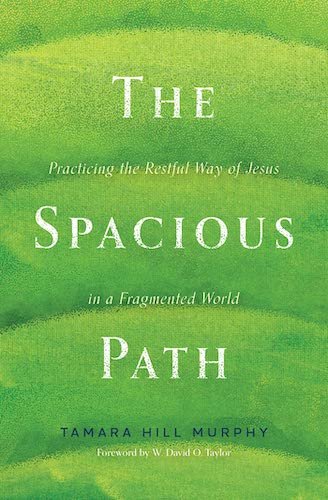The Spacious Path
These days I’m slowly making my way through a prerelease copy of Tamara Hill Murphy’s The Spacious Path: Practicing the Restful Way of Jesus in a Fragmented World (Herald), which hits bookshelves later this month. It’s a gentle, approachable invitation to adopt a Rule of Life, a spiritual practice going back to the days of Saint Benedict and the monastic communities he founded.
For some of us, quite understandably, the word “rule” has a tendency to set off alarm bells—especially when applied to the spiritual life. Maybe it gives off a whiff of legalism. Or maybe we’ve been in churches where leaders (whether they mean to or not) weigh us down with burdens too heavy to bear.
Fortunately, this book is neither legalistic nor burdensome. The spiritual practices Murphy invites us to cultivate are, in fact, gifts that can free us from much of what entangles, like anxiety, dis-integration, and godless perfectionism. A Rule of Life is a paradox, much like the “easy” and “light” yoke of Jesus. And it’s a gift not just for ourselves, but for those around us. It is, as Benedict himself put it, a “little discipline to safeguard love.”
The Spacious Path is an invitation to a contemplative way of being in the world, both individually and in community. It’s one thing for a monk to live a contemplative life; it feels like something else entirely for you and me. But we can take steps to cultivate receptivity to what God has to say to us. Even small steps will do.
Murphy writes movingly of a practice her husband, an Anglican priest, has brought with him from one church to another. Because none of us are very good at being silent, we need opportunities to practice. So each week at Church of the Apostles in Bridgeport, Connecticut, usually after the sermon, Fr. Brian gives his parishioners just that.
The idea, Murphy tells us, comes not from Saint Benedict or some seminary class, but from Mr. Rogers. During his short acceptance speech for a Lifetime Achievement Emmy award, Mr. Rogers acknowledged he achieved nothing alone, saying, “All of us have special ones who have loved us into being.” Then he did something crazy. He looked out at the room of entertainers and said, “Would you just take, along with me, ten seconds to think of the people who have helped you become who you are—those who have cared about you and wanted what was best for you in life?”
“Ten seconds of silence,” he said. “I’ll watch the time.”
It’s a profound moment. We hear nervous laughter. We see tears in recognizable eyes. No one’s performing anymore.
In the same way, each week Fr. Brian invites his parishioners to sit in silence, not for ten seconds—which, as the awards crowd could tell you, is unnatural enough—but for a full minute or two, saying, “Bow your head and close your eyes. I’ll watch the time.”
Who’s to say what might happen during that minute or two of silence on a Sunday morning at that church in Bridgeport? Maybe nothing discernible at all. Then again, if we never try, we’ll never know. Besides, the monastics teach us that without times of contemplation, we will never be able to live wholehearted lives.
“By keeping silence together, we understand that sometimes we’re just holding space for our friends to hear something from God,” Murphy writes. “Perhaps the most treasured gift of silence is the way that together we can be reminded with no words at all that God loves us and God likes us.”
